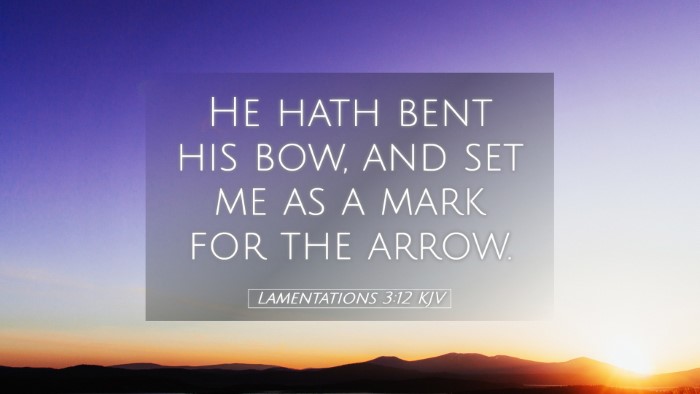Lamentations 3:12 Commentary
Lamentations 3:12 states:
"He has bent His bow and set me as a target for the arrow."
Introduction
The Book of Lamentations expresses profound sorrow and grief over the destruction of Jerusalem and the suffering of its people. Chapter 3 offers a poignant depiction of personal anguish, exemplified in verse 12. Here, the prophet conveys a vivid image of God's judgment, using the metaphor of an archer and a target. This commentary will draw from the insights of prominent public domain theologians including Matthew Henry, Albert Barnes, and Adam Clarke, providing a comprehensive understanding of this impactful verse.
Contextual Background
Lamentations is attributed to the prophet Jeremiah, reflecting on the fall of Jerusalem around 586 B.C. The emotional weight of the text emanates from the historical context of exile and suffering. In chapters 1 and 2, Jeremiah laments the desolation of the city and the people, and chapter 3 returns to a more personal tone as he grapples with his own suffering.
Verse Analysis
Metaphor of the Archer
The imagery in Lamentations 3:12 is striking. God is depicted as an archer who has drawn His bow, aiming at the prophet himself:
- Divine Sovereignty: The mention of God bending His bow underscores His sovereignty over both the natural and spiritual realms. Matthew Henry notes that God's actions are not capricious; rather, they are deliberate and calculated, serving divine purposes.
- Personal Affliction: Albert Barnes points out that the prophet feels personally targeted by God's judgment. This reflects a broader theme in the book where individual suffering is intertwined with national calamity.
The Nature of God's Judgment
Jeremiah’s lament expresses a tension between God’s judgment and mercy:
- Judgment as Discipline: Adam Clarke emphasizes that God's judgment is not merely punitive but serves as a corrective measure. The prophet understands that the suffering he endures is a result of Israel's collective sins.
- Expressing Vulnerability: The use of a bow and arrow symbolizes vulnerability. Jeremiah recognizes his precarious position and the real threat to his existence. This vulnerability resonates deeply with readers who may also feel besieged by life’s trials.
Theological Implications
In Lamentations 3:12, several theological themes emerge:
- The Problem of Evil: This verse raises questions about suffering and the nature of God. If God is sovereign, how do we reconcile His apparent targeting of individuals with the notion of a loving deity? Matthew Henry argues that God's judgments, though severe, are rooted in righteousness, suggesting that suffering can lead to repentance and restoration.
- Hope Amid Despair: Notably, the surrounding verses in Lamentations 3 shift from despair to hope. While verse 12 presents a grim reality, subsequent verses reveal the steadfast love of the Lord, illustrating that even in the depths of despair, there is a glimmer of hope in God’s mercy.
- Personal Relationship with God: The intimate nature of the metaphor, depicting God as an archer, signifies a personal relationship with the divine. The prophet’s experience is a reminder that suffering often leads to a deeper understanding of one’s reliance on God.
Practical Applications
For pastors and theologians, Lamentations 3:12 offers essential insights for preaching and counseling:
- Empathy in Suffering: Understanding personal anguish allows ministers to connect with those in their congregation experiencing hardship. This verse serves as a reminder that God's discipline is not devoid of compassion.
- Encouraging Hope: In preaching, it is crucial to balance the themes of judgment with the introduction of hope. As seen in the progression of Lamentations 3, lament can lead to worship when coupled with an assurance of God’s faithfulness.
- Personal Reflection: For students and scholars, examining this verse can lead to personal introspection regarding one's own experiences of suffering and the sovereignty of God in those moments.
Conclusion
Lamentations 3:12 invites readers to explore the depths of human suffering while anchoring the discussion in God’s omnipotence and mercy. As the prophet Jeremiah portrays God as an archer, the imagery encapsulates the tension of divine judgment, personal despair, and eventual hope. By reflecting on this verse, pastors, students, and scholars can draw valuable lessons for their own lives and ministries, ultimately leading to a deeper faith and understanding of God’s character in the face of adversity.


